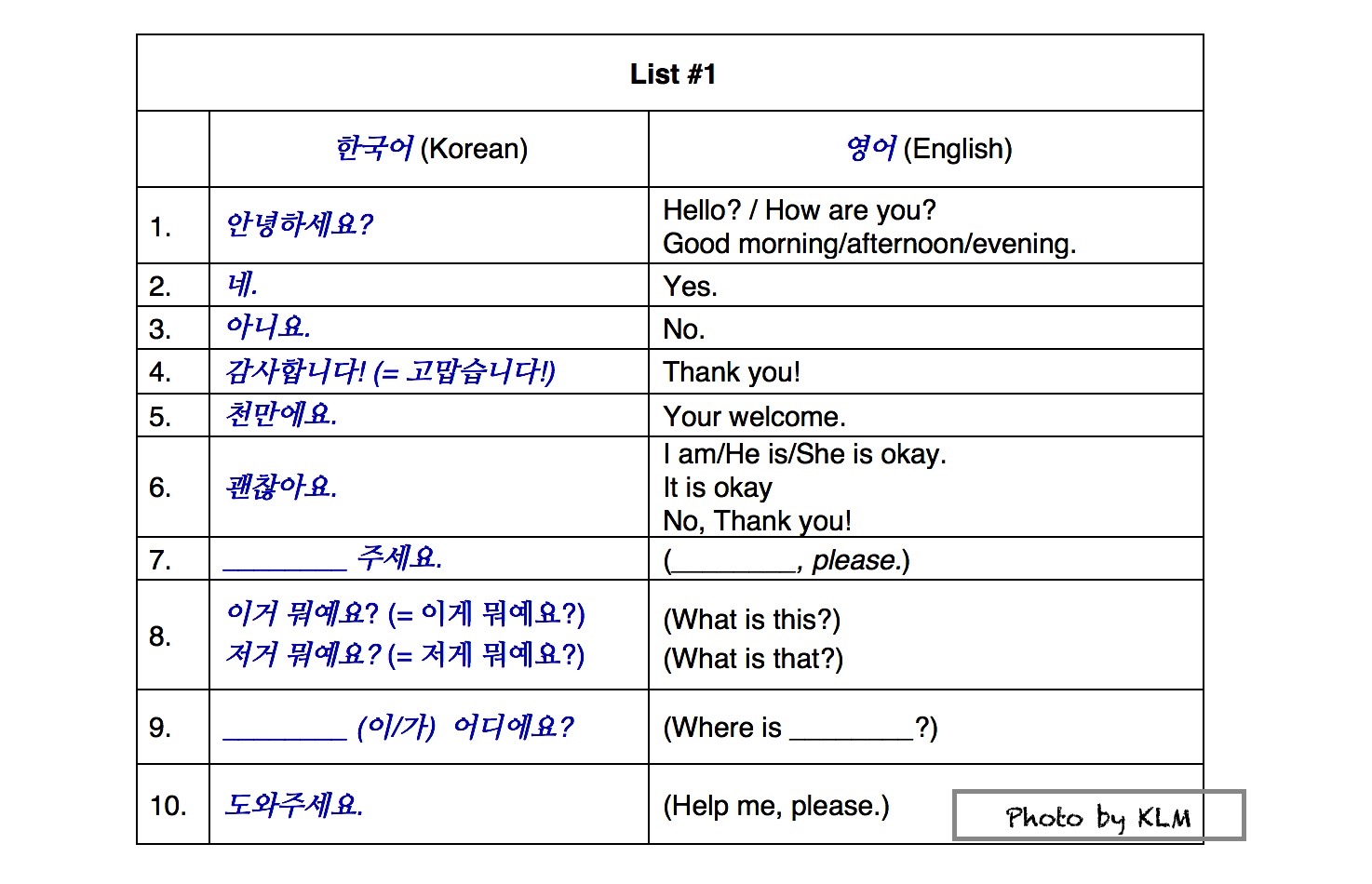10 Vital but Simple Expressions in Korean #1 Posted by Kyung-Hwa on Jan 4, 2017 in Grammar, Korean Language, Vocabulary
Simple Korean phrases can go such a long way!
Whether you are studying Korean language for your business/schooling or to just fulfill your curiosity in the Korean language and culture, simple Korean expressions can go such a long way. I put together the following list of useful expressions in the polite spoken form, so you can utilize them to initiate a conversation with the native Korean speakers or simply to add a peace of mind to enjoy living in Korea.

- 안녕하세요? (Hello? / How are you? or Good morning/afternoon/evening.)
- This is very simple but probably the most used Korean phrase. It is a polite way to greet Korean speakers and a useful phrase to initiate a conversation.
- You can use this phrase throughout the day.
- The formal version is “안녕하십니까?”
- You can simply respond to the speaker,
“네, 안녕하세요? (Yes, How are you?)
- 네. (Yes)
- 아니요. (No.)
- 감사합니다! (Thank you!)
- As you are aware, “Thank you” is one of the first expressions that you learn in any foreign language.
- You will also equally hear “고맙습니다!”
- You can use “감사합니다. & 고맙습니다”
- 천만에요. (You’re welcome.)
- 괜찮아요. (I am/He is/She is okay, It is okay, or No, thank you!)
ex)
• A: 도와드려요? (Do you need help?)
B: 아니요, 괜찮아요. (No, I am Okay.)
• A: 새 책 어때요? (How is the new book?)
B: 괜찮아요. (It is okay.)
• A: 음료수 드시겠어요? Would you like something to drink?
B: 아니요, 괜찮아요. (No, I am Okay.)
* In this case, it is equivalent to “No, thank you” in English.)
- ________ 주세요. (________, please.)
- Its direct translation is “Please give me ________.”
- This is an important phrase to remember to survive in Korea. It is a polite way to ask for something; you can add this phrase at the end of the sentence.
ex) 김치 주세요. (Kimchi, please.)
커피 주세요. (Coffee, Please.)
- When you don’t know the name of the food at the Korean restaurant or name of the item at the store, you can
ex) point at it and say 주세요.
- When you request something to someone.
ex) 한국어 숙제 좀 도와주세요. (Would you please help me with my Korean homework?)
- 이거 뭐예요? (What is this?) / 저거 뭐예요? (What is that?)
- 이거 & 저거, these are demonstrative nouns in Korean.
* Since you learned demonstrative nouns in Korean, you can add 이거/저거 to주세요. (This/That, please.)
- When you are curious about something or need to figure out the name of certain things you can use the above expressions.
- 이거 means this
“이게” also means “this” in Korean, so you will hear the following expression as well, “이게 뭐예요?” instead of “이거 뭐예요?”
- 저거 means that
“저게” also means “that” in Korean, so you will hear the following expression as well, “저게 뭐예요?” instead of “저거 뭐예요?”
- ________ (이/가) 어디에요? (Where is ________?)
- When you are in Korea, this might be the most vital phrase to remember to ask for the restroom, or locate somewhere that you need to go.
ex) 화장실(이) 어디에요? (Where is the restroom?)
집(이) 어디예요? (It literally means “Where is your home?”, but it is interpreted as “Where do you live?”)
- In Korean language, you need to add subject makers 이/가 after a pronoun or noun, however these subject markers are frequently dropped in the spoken Korean.
- 도와주세요. (Help me, please.)
- This is a necessary expression to remember when you are in a distressed situation.
- Koreans are very kind and compassionate people, and they will generally put their hand out to help someone who appears to be in need of assistance. However, they are not mind readers, so it is a great idea to speak up when you need help from them.
I hope you will find the usefulness of the above expressions when you communicate with Korean speakers or when you learn to enjoy living in Korea.
Which one do you find the most useful? I would love to hear your comments.
새해 복 많이 받으세요! (Happy New Year!)
감사합니다! (Thank you!)

Build vocabulary, practice pronunciation, and more with Transparent Language Online. Available anytime, anywhere, on any device.



